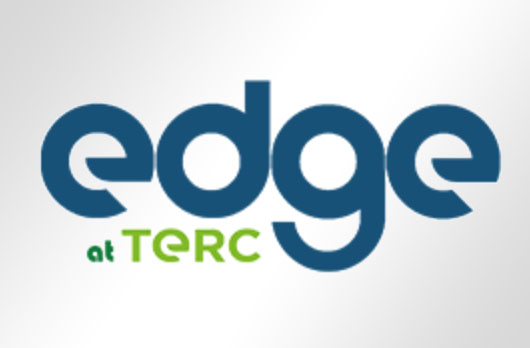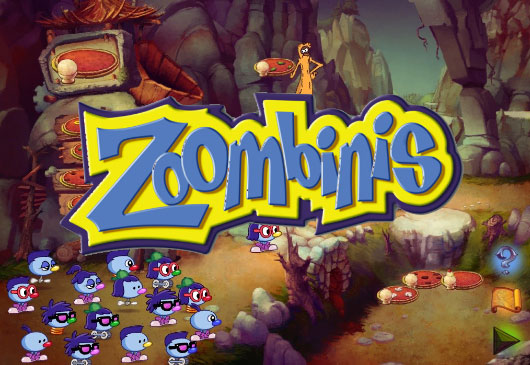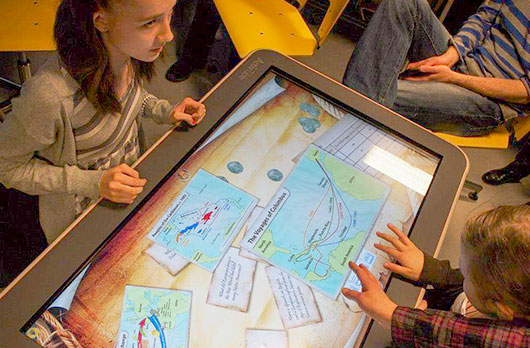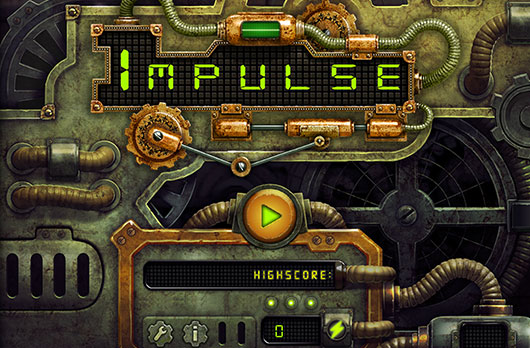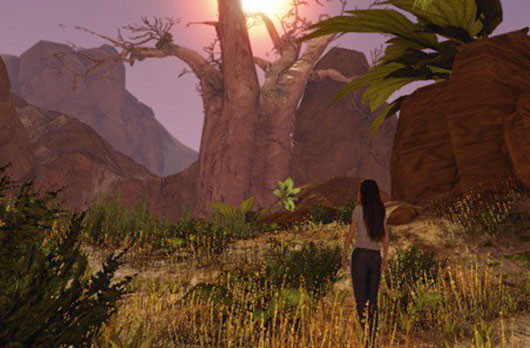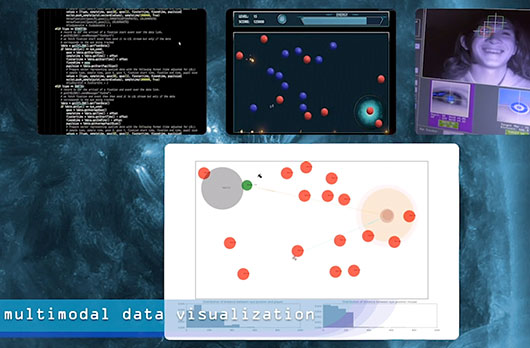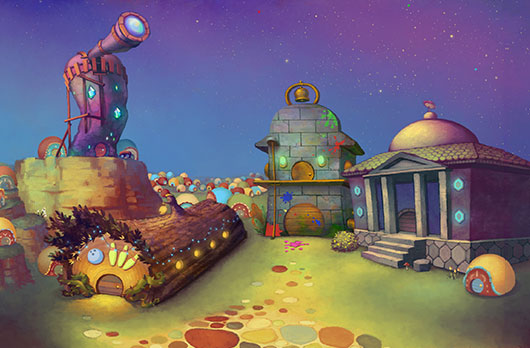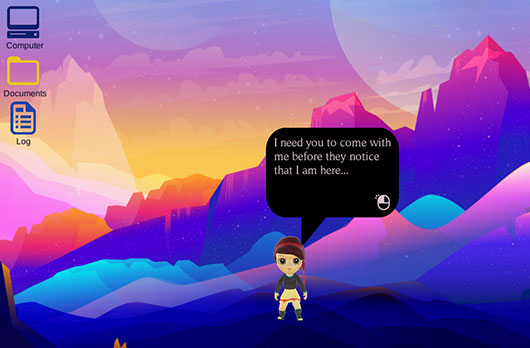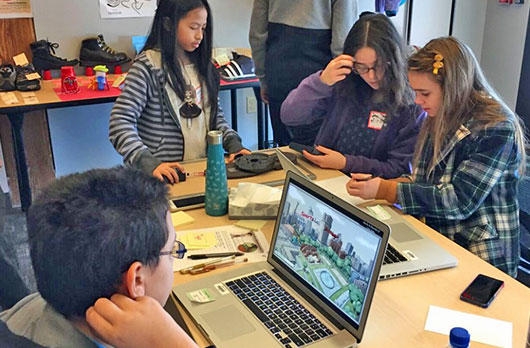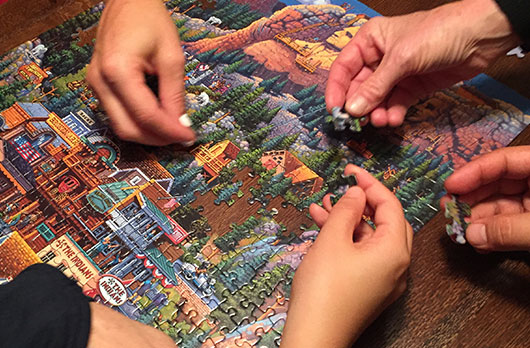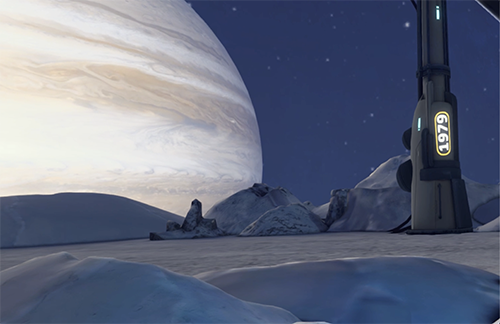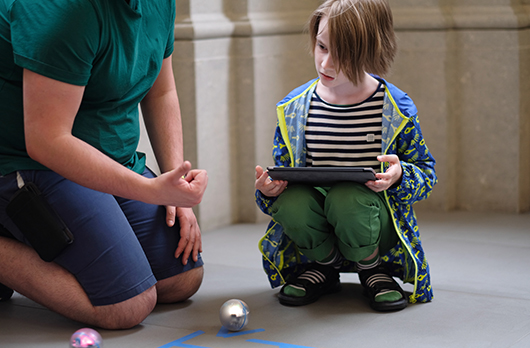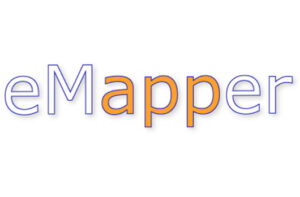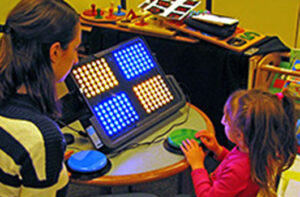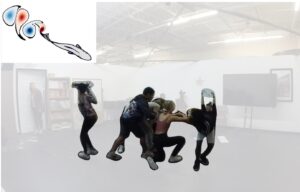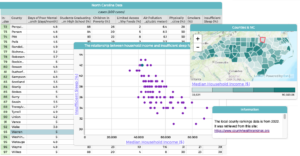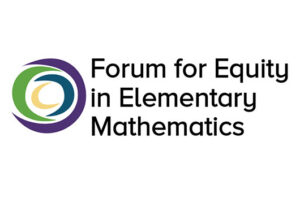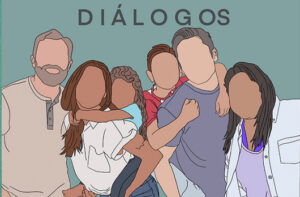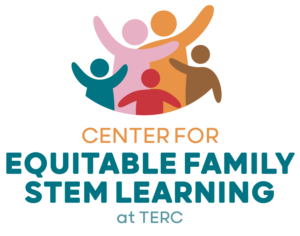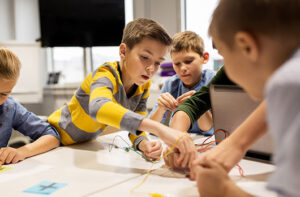EdGE
EdGE is a team of educators, designers, and researchers who design and research STEM-learning games, as well as other technology tools for differentiated and adaptive learning.
Lead Staff:
Jodi Asbell-ClarkeProject Staff:
Erin BardarIbrahim Dahlstrom-Hakki
Teon Edwards
Santiago Gasca
Jamie Larsen
Kelly Paulson
Tara Robillard
Elizabeth Rowe
Renee Pawlowski
SummaryEdGE designs and studies digital games and environments to learn how to engage all learners in STEM, especially those who are “falling through the cracks”. Using innovative methods in design and research, EdGE has grown a suite of research-based STEM learning games and is helping inform the field about how game-based learning can be used to reach learners with cognitive differences (e.g. Autism, dyslexia or dyscalculia, ADHD, and other learning differences). EdGE research often uses the digital data logs generated through gameplay to create innovative assessments that measure what learners can do — not just what they can say on test. EdGE has designed an innovative method and suite of tools for game-based learning assessment (GBLA) that help researchers study learners’ patterns of activity within learning environments to understand what they know. Using Educational Data Mining (EDM), EdGE researchers build automated detectors based upon theoretical grounding and following extensive observational research to identify evidence of learning of STEM learning (science, math, and computational thinking) as well as social-emotional aspects of learning in various game contexts.
Areas of Interest
- Education for all learners
- Free-choice Science, Math, and Computational Thinking learning games; playful learning environments and materials that transcend formal and informal boundaries
- Using digital technologies to foster experiences not otherwise possible and to (re)connect learners with the outdoors
- Game-based learning assessments of STEM and Social-Emotional Learning (SEL)
- Teacher “bridging” to make connections between implicit game-based learning and explicit classroom learning.
- Implicit assessments that can be applied to a range of digital learning environments
- Educational Data Mining for automated detection of implicit STEM learning and SEL
- Differentiation and adaptation for people with learning differences
EdGE's HistoryIn 2009, Jodi Asbell-Clarke, Teon Edwards, and Jamie Larsen co-founded the Educational Gaming Environments group (EdGE) at TERC, beginning with the Blue Mars Science Center—the design and research of a science-inquiry game in the massively multiplayer online environment (MMO), or virtual world, Blue Mars (NSF grant #0917520). The EdGE game Martian Boneyards engaged over 600 adult players in solving a science-based mystery for 4 months in 2010. Following this successful proof of concept for game-based learning and assessment, EdGE’s work and team expanded and evolved with a broad array of projects. Some of these are detailed in “Key Projects and Other Initiatives” below.
Examples include:In 2010 and 2011, EdGE continued its transmedia learning gaming efforts with Arcadia Resource Center and Arcadia: The Next Generation (NSF grants #1043357 and #1134919) and in 2011 EdGE transitioned to mobile with a set of game apps with Leveling Up (NSF grant #119144), —Impulse, Quantum Spectre, and Ravenous. The goal of Leveling Up games was to address high school physics and biology concepts while achieving free-choice, or public, play. In nationwide studies, EdGE designed and validated methods of measuring the tacit, or implicit, learning that occurred in these games and the role educators played in bridging game-based learning to explicit classroom learning. In 2013, EdGE began leveraging these innovations in game-based learning assessment to address the specific needs of cognitively diverse learners. As part of Revealing the Invisible, EdGE teamed with Landmark College and MIT to use eye tracking and the game Impulse to study player attention, focusing on students with dyslexia, ADHD, and/or an autism spectrum disorder (NSF grant #1417967).
Show More
Show Less
In 2015, TERC re-released the award-winning logic puzzle game Zoombinis, updating it for modern tablets and computer platforms. And EdGE conducted a nation-wide Zoombinis Implementation Study, researching how the game and bridging curriculum materials impacted grade 3-8 students’ computational thinking (CT) skills (NSF grant #1502882). This research highlights the potential overlap between common cognitive differences (e.g. executive function) and the foundations of computational thinking (e.g. problem decomposition, pattern recognition, and abstraction). In 2017, EdGE began a research-practice partnership (RPP) with Braintree Public Schools in Braintree, MA to co-design and research how computational thinking (CT) can support STEM learning in grades 3-8, with a focus on differentiation for cognitively diverse learners (NSF grant #1738574). After a decade of progress in STEM game-based learning, EdGE is now focusing primarily on research and design for inclusion of cognitively diverse learners using multi-modal analytics, XR and VR technologies, and Computational Thinking.
Today, EdGE’s work continues, as the team strives to design research-grounded methods for differentiation and inclusion of cognitively diverse learners in STEM
Key Projects and Other Initiatives
- Blue Mars Science Center (NSF grant #0917520) — EdGE designed and researched a science-inquiry game, Martian Boneyards, in the massively multiplayer online environment (MMO), or virtual world, Blue Mars.
- Arcadia Resource Center and Arcadia: The Next Generation (NSF grants #1043357 and #1134919) — EdGE designed and researched the web-based scientific-mystery game Canaries in a Coalmine, endeavoring to engage the public with online scientific resources about birds.
- Leveling Up (NSF grant #119144) — EdGE designed a set of mobile game apps to build players’ tacit, or implicit, science learning through gameplay and researched the roles educators play in bridging to the explicit, classroom-content learning.
- FUN: Finland-US Network (NSF grant #1252709) — EdGE collaborated with US and Finnish partners to study engagement and learning in games, looking at cross-cultural and cross-institutional research opportunities.
- SportsLab (NSF grant #1311901) — EdGE created an online gaming platform and ran a parkour shoe design competition, in conjunction with Nike, using interest in sports to build students’ awareness of STEM careers and develop their 21st Century skills.
- Revealing the Invisible (NSF grant #1417967) — EdGE teamed with Landmark College and MIT to use eye tracking and the Leveling Up game Impulse to study player attention, focusing on students with learning differences such as dyslexia, ADHD, and/or an autism spectrum disorder.
- STEMlandia and STEMlandia XR — EdGE worked to exploit digital tools, including geocaching and mixed reality, to get people outside and (re)engaged with the science, and world, around us.
- Taking Games to School (NSF grant #1415284) — EdGE investigated teacher dashboards and using the Zoombinis gameplay data logs and detectors, which were vital to the research, to deliver actionable tools, information, and resources to teachers.
Current Projects
- Zoombinis Implementation Study (NSF grant #1502882) — EdGE conducted a nationwide implementation study and is currently finishing research on how the game Zoombinis and bridging curriculum materials impact grade 3-8 students’ computational thinking (CT) skills.
- CodePlay (NSF grant #1738574) — EdGE and the Braintree Public Schools in Braintree, MA began a research-practice partnership (RPP) to co-design and research how computational thinking (CT) can support STEM learning in grades 3-8, with a focus on differentiation for cognitvely diverse learners.
- AR with PTC — EdGE is working with the company PTC to explore the potential of the Internet of Things (IoT) and Augmented Reality (AR) in K-12 education.
- May’s Journey — EdGE is using game design mechanics as metaphors to enhance learning of introductory programming concepts.
- Mission to Europa Prime — EdGE, in partnership with MXTreality, is developing a Virtual Reality (VR) demo, immersing players in a science-based puzzle and mystery experience in a fictional science station on and in the oceans on the Jovian moon Europa.
EdGE designs and studies digital games and environments to learn how to engage all learners in STEM, especially those who are “falling through the cracks”. Using innovative methods in design and research, EdGE has grown a suite of research-based STEM learning games and is helping inform the field about how game-based learning can be used to reach learners with cognitive differences (e.g. Autism, dyslexia or dyscalculia, ADHD, and other learning differences). EdGE research often uses the digital data logs generated through gameplay to create innovative assessments that measure what learners can do — not just what they can say on test. EdGE has designed an innovative method and suite of tools for game-based learning assessment (GBLA) that help researchers study learners’ patterns of activity within learning environments to understand what they know. Using Educational Data Mining (EDM), EdGE researchers build automated detectors based upon theoretical grounding and following extensive observational research to identify evidence of learning of STEM learning (science, math, and computational thinking) as well as social-emotional aspects of learning in various game contexts.
- Education for all learners
- Free-choice Science, Math, and Computational Thinking learning games; playful learning environments and materials that transcend formal and informal boundaries
- Using digital technologies to foster experiences not otherwise possible and to (re)connect learners with the outdoors
- Game-based learning assessments of STEM and Social-Emotional Learning (SEL)
- Teacher “bridging” to make connections between implicit game-based learning and explicit classroom learning.
- Implicit assessments that can be applied to a range of digital learning environments
- Educational Data Mining for automated detection of implicit STEM learning and SEL
- Differentiation and adaptation for people with learning differences
EdGE's HistoryIn 2009, Jodi Asbell-Clarke, Teon Edwards, and Jamie Larsen co-founded the Educational Gaming Environments group (EdGE) at TERC, beginning with the Blue Mars Science Center—the design and research of a science-inquiry game in the massively multiplayer online environment (MMO), or virtual world, Blue Mars (NSF grant #0917520). The EdGE game Martian Boneyards engaged over 600 adult players in solving a science-based mystery for 4 months in 2010. Following this successful proof of concept for game-based learning and assessment, EdGE’s work and team expanded and evolved with a broad array of projects. Some of these are detailed in “Key Projects and Other Initiatives” below.
Examples include:In 2010 and 2011, EdGE continued its transmedia learning gaming efforts with Arcadia Resource Center and Arcadia: The Next Generation (NSF grants #1043357 and #1134919) and in 2011 EdGE transitioned to mobile with a set of game apps with Leveling Up (NSF grant #119144), —Impulse, Quantum Spectre, and Ravenous. The goal of Leveling Up games was to address high school physics and biology concepts while achieving free-choice, or public, play. In nationwide studies, EdGE designed and validated methods of measuring the tacit, or implicit, learning that occurred in these games and the role educators played in bridging game-based learning to explicit classroom learning. In 2013, EdGE began leveraging these innovations in game-based learning assessment to address the specific needs of cognitively diverse learners. As part of Revealing the Invisible, EdGE teamed with Landmark College and MIT to use eye tracking and the game Impulse to study player attention, focusing on students with dyslexia, ADHD, and/or an autism spectrum disorder (NSF grant #1417967).
Show More
Show Less
In 2015, TERC re-released the award-winning logic puzzle game Zoombinis, updating it for modern tablets and computer platforms. And EdGE conducted a nation-wide Zoombinis Implementation Study, researching how the game and bridging curriculum materials impacted grade 3-8 students’ computational thinking (CT) skills (NSF grant #1502882). This research highlights the potential overlap between common cognitive differences (e.g. executive function) and the foundations of computational thinking (e.g. problem decomposition, pattern recognition, and abstraction). In 2017, EdGE began a research-practice partnership (RPP) with Braintree Public Schools in Braintree, MA to co-design and research how computational thinking (CT) can support STEM learning in grades 3-8, with a focus on differentiation for cognitively diverse learners (NSF grant #1738574). After a decade of progress in STEM game-based learning, EdGE is now focusing primarily on research and design for inclusion of cognitively diverse learners using multi-modal analytics, XR and VR technologies, and Computational Thinking.
Today, EdGE’s work continues, as the team strives to design research-grounded methods for differentiation and inclusion of cognitively diverse learners in STEM
Key Projects and Other Initiatives
- Blue Mars Science Center (NSF grant #0917520) — EdGE designed and researched a science-inquiry game, Martian Boneyards, in the massively multiplayer online environment (MMO), or virtual world, Blue Mars.
- Arcadia Resource Center and Arcadia: The Next Generation (NSF grants #1043357 and #1134919) — EdGE designed and researched the web-based scientific-mystery game Canaries in a Coalmine, endeavoring to engage the public with online scientific resources about birds.
- Leveling Up (NSF grant #119144) — EdGE designed a set of mobile game apps to build players’ tacit, or implicit, science learning through gameplay and researched the roles educators play in bridging to the explicit, classroom-content learning.
- FUN: Finland-US Network (NSF grant #1252709) — EdGE collaborated with US and Finnish partners to study engagement and learning in games, looking at cross-cultural and cross-institutional research opportunities.
- SportsLab (NSF grant #1311901) — EdGE created an online gaming platform and ran a parkour shoe design competition, in conjunction with Nike, using interest in sports to build students’ awareness of STEM careers and develop their 21st Century skills.
- Revealing the Invisible (NSF grant #1417967) — EdGE teamed with Landmark College and MIT to use eye tracking and the Leveling Up game Impulse to study player attention, focusing on students with learning differences such as dyslexia, ADHD, and/or an autism spectrum disorder.
- STEMlandia and STEMlandia XR — EdGE worked to exploit digital tools, including geocaching and mixed reality, to get people outside and (re)engaged with the science, and world, around us.
- Taking Games to School (NSF grant #1415284) — EdGE investigated teacher dashboards and using the Zoombinis gameplay data logs and detectors, which were vital to the research, to deliver actionable tools, information, and resources to teachers.
Current Projects
- Zoombinis Implementation Study (NSF grant #1502882) — EdGE conducted a nationwide implementation study and is currently finishing research on how the game Zoombinis and bridging curriculum materials impact grade 3-8 students’ computational thinking (CT) skills.
- CodePlay (NSF grant #1738574) — EdGE and the Braintree Public Schools in Braintree, MA began a research-practice partnership (RPP) to co-design and research how computational thinking (CT) can support STEM learning in grades 3-8, with a focus on differentiation for cognitvely diverse learners.
- AR with PTC — EdGE is working with the company PTC to explore the potential of the Internet of Things (IoT) and Augmented Reality (AR) in K-12 education.
- May’s Journey — EdGE is using game design mechanics as metaphors to enhance learning of introductory programming concepts.
- Mission to Europa Prime — EdGE, in partnership with MXTreality, is developing a Virtual Reality (VR) demo, immersing players in a science-based puzzle and mystery experience in a fictional science station on and in the oceans on the Jovian moon Europa.
In 2009, Jodi Asbell-Clarke, Teon Edwards, and Jamie Larsen co-founded the Educational Gaming Environments group (EdGE) at TERC, beginning with the Blue Mars Science Center—the design and research of a science-inquiry game in the massively multiplayer online environment (MMO), or virtual world, Blue Mars (NSF grant #0917520). The EdGE game Martian Boneyards engaged over 600 adult players in solving a science-based mystery for 4 months in 2010. Following this successful proof of concept for game-based learning and assessment, EdGE’s work and team expanded and evolved with a broad array of projects. Some of these are detailed in “Key Projects and Other Initiatives” below.
In 2010 and 2011, EdGE continued its transmedia learning gaming efforts with Arcadia Resource Center and Arcadia: The Next Generation (NSF grants #1043357 and #1134919) and in 2011 EdGE transitioned to mobile with a set of game apps with Leveling Up (NSF grant #119144), —Impulse, Quantum Spectre, and Ravenous. The goal of Leveling Up games was to address high school physics and biology concepts while achieving free-choice, or public, play. In nationwide studies, EdGE designed and validated methods of measuring the tacit, or implicit, learning that occurred in these games and the role educators played in bridging game-based learning to explicit classroom learning. In 2013, EdGE began leveraging these innovations in game-based learning assessment to address the specific needs of cognitively diverse learners. As part of Revealing the Invisible, EdGE teamed with Landmark College and MIT to use eye tracking and the game Impulse to study player attention, focusing on students with dyslexia, ADHD, and/or an autism spectrum disorder (NSF grant #1417967).
In 2015, TERC re-released the award-winning logic puzzle game Zoombinis, updating it for modern tablets and computer platforms. And EdGE conducted a nation-wide Zoombinis Implementation Study, researching how the game and bridging curriculum materials impacted grade 3-8 students’ computational thinking (CT) skills (NSF grant #1502882). This research highlights the potential overlap between common cognitive differences (e.g. executive function) and the foundations of computational thinking (e.g. problem decomposition, pattern recognition, and abstraction). In 2017, EdGE began a research-practice partnership (RPP) with Braintree Public Schools in Braintree, MA to co-design and research how computational thinking (CT) can support STEM learning in grades 3-8, with a focus on differentiation for cognitively diverse learners (NSF grant #1738574). After a decade of progress in STEM game-based learning, EdGE is now focusing primarily on research and design for inclusion of cognitively diverse learners using multi-modal analytics, XR and VR technologies, and Computational Thinking.
Today, EdGE’s work continues, as the team strives to design research-grounded methods for differentiation and inclusion of cognitively diverse learners in STEM
Key Projects and Other Initiatives
- Blue Mars Science Center (NSF grant #0917520) — EdGE designed and researched a science-inquiry game, Martian Boneyards, in the massively multiplayer online environment (MMO), or virtual world, Blue Mars.
- Arcadia Resource Center and Arcadia: The Next Generation (NSF grants #1043357 and #1134919) — EdGE designed and researched the web-based scientific-mystery game Canaries in a Coalmine, endeavoring to engage the public with online scientific resources about birds.
- Leveling Up (NSF grant #119144) — EdGE designed a set of mobile game apps to build players’ tacit, or implicit, science learning through gameplay and researched the roles educators play in bridging to the explicit, classroom-content learning.
- FUN: Finland-US Network (NSF grant #1252709) — EdGE collaborated with US and Finnish partners to study engagement and learning in games, looking at cross-cultural and cross-institutional research opportunities.
- SportsLab (NSF grant #1311901) — EdGE created an online gaming platform and ran a parkour shoe design competition, in conjunction with Nike, using interest in sports to build students’ awareness of STEM careers and develop their 21st Century skills.
- Revealing the Invisible (NSF grant #1417967) — EdGE teamed with Landmark College and MIT to use eye tracking and the Leveling Up game Impulse to study player attention, focusing on students with learning differences such as dyslexia, ADHD, and/or an autism spectrum disorder.
- STEMlandia and STEMlandia XR — EdGE worked to exploit digital tools, including geocaching and mixed reality, to get people outside and (re)engaged with the science, and world, around us.
- Taking Games to School (NSF grant #1415284) — EdGE investigated teacher dashboards and using the Zoombinis gameplay data logs and detectors, which were vital to the research, to deliver actionable tools, information, and resources to teachers.
Current Projects
- Zoombinis Implementation Study (NSF grant #1502882) — EdGE conducted a nationwide implementation study and is currently finishing research on how the game Zoombinis and bridging curriculum materials impact grade 3-8 students’ computational thinking (CT) skills.
- CodePlay (NSF grant #1738574) — EdGE and the Braintree Public Schools in Braintree, MA began a research-practice partnership (RPP) to co-design and research how computational thinking (CT) can support STEM learning in grades 3-8, with a focus on differentiation for cognitvely diverse learners.
- AR with PTC — EdGE is working with the company PTC to explore the potential of the Internet of Things (IoT) and Augmented Reality (AR) in K-12 education.
- May’s Journey — EdGE is using game design mechanics as metaphors to enhance learning of introductory programming concepts.
- Mission to Europa Prime — EdGE, in partnership with MXTreality, is developing a Virtual Reality (VR) demo, immersing players in a science-based puzzle and mystery experience in a fictional science station on and in the oceans on the Jovian moon Europa.
- Blue Mars Science Center (NSF grant #0917520) — EdGE designed and researched a science-inquiry game, Martian Boneyards, in the massively multiplayer online environment (MMO), or virtual world, Blue Mars.
- Arcadia Resource Center and Arcadia: The Next Generation (NSF grants #1043357 and #1134919) — EdGE designed and researched the web-based scientific-mystery game Canaries in a Coalmine, endeavoring to engage the public with online scientific resources about birds.
- Leveling Up (NSF grant #119144) — EdGE designed a set of mobile game apps to build players’ tacit, or implicit, science learning through gameplay and researched the roles educators play in bridging to the explicit, classroom-content learning.
- FUN: Finland-US Network (NSF grant #1252709) — EdGE collaborated with US and Finnish partners to study engagement and learning in games, looking at cross-cultural and cross-institutional research opportunities.
- SportsLab (NSF grant #1311901) — EdGE created an online gaming platform and ran a parkour shoe design competition, in conjunction with Nike, using interest in sports to build students’ awareness of STEM careers and develop their 21st Century skills.
- Revealing the Invisible (NSF grant #1417967) — EdGE teamed with Landmark College and MIT to use eye tracking and the Leveling Up game Impulse to study player attention, focusing on students with learning differences such as dyslexia, ADHD, and/or an autism spectrum disorder.
- STEMlandia and STEMlandia XR — EdGE worked to exploit digital tools, including geocaching and mixed reality, to get people outside and (re)engaged with the science, and world, around us.
- Taking Games to School (NSF grant #1415284) — EdGE investigated teacher dashboards and using the Zoombinis gameplay data logs and detectors, which were vital to the research, to deliver actionable tools, information, and resources to teachers.
- Zoombinis Implementation Study (NSF grant #1502882) — EdGE conducted a nationwide implementation study and is currently finishing research on how the game Zoombinis and bridging curriculum materials impact grade 3-8 students’ computational thinking (CT) skills.
- CodePlay (NSF grant #1738574) — EdGE and the Braintree Public Schools in Braintree, MA began a research-practice partnership (RPP) to co-design and research how computational thinking (CT) can support STEM learning in grades 3-8, with a focus on differentiation for cognitvely diverse learners.
- AR with PTC — EdGE is working with the company PTC to explore the potential of the Internet of Things (IoT) and Augmented Reality (AR) in K-12 education.
- May’s Journey — EdGE is using game design mechanics as metaphors to enhance learning of introductory programming concepts.
- Mission to Europa Prime — EdGE, in partnership with MXTreality, is developing a Virtual Reality (VR) demo, immersing players in a science-based puzzle and mystery experience in a fictional science station on and in the oceans on the Jovian moon Europa.
